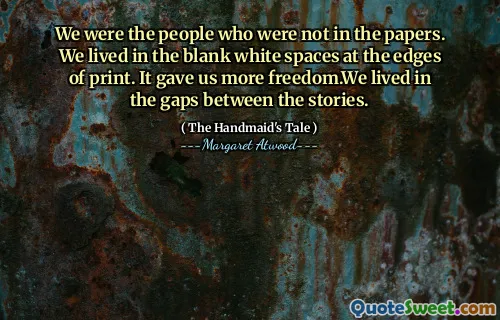You can't help what you feel, Moira said once, but you can help how you behave.
In "The Handmaid's Tale," Moira expresses a significant idea about emotional control. She suggests that while feelings are involuntary and arise naturally, individuals have the power to choose their reactions and behaviors in response to those feelings. This perspective emphasizes personal responsibility and self-regulation, highlighting the distinction between internal emotions and external actions.
This notion is pivotal in the oppressive context of the novel, where characters are often constrained by societal expectations and rules. By acknowledging that emotions cannot be repressed but behaviors can be managed, Moira inspires a sense of empowerment, encouraging individuals to navigate their circumstances with agency and intention.






